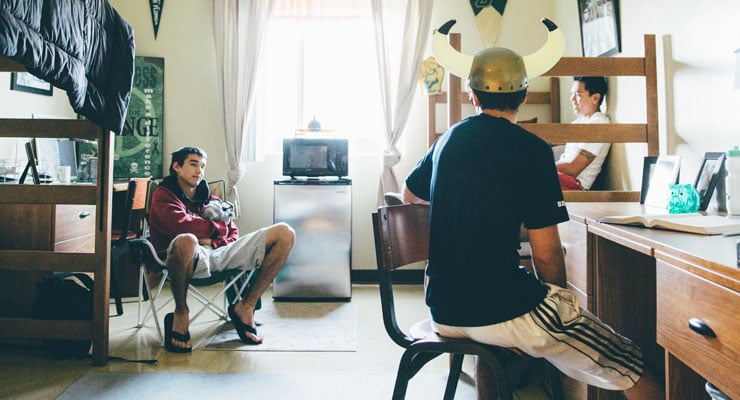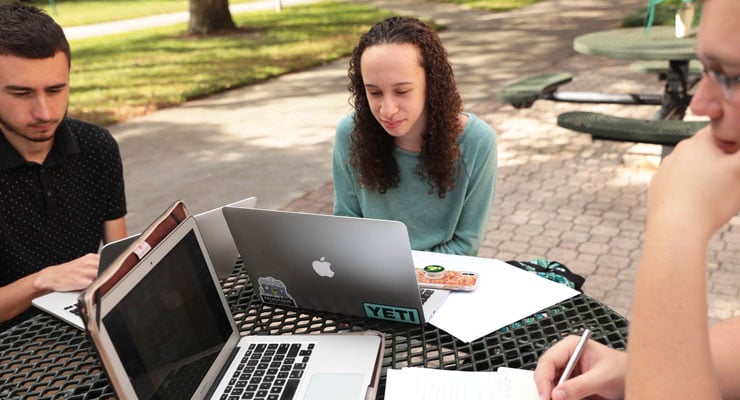The 5 Biggest Differences Between High School and College Life
By Riley Herr | Last Updated: Mar 5, 2025

Stepping into your first year of college after high school can be intimidating. You may be enjoying the sense of freedom that comes with college, while also struggling to juggle your new responsibilities. Clear up any freshman confusion by learning about the biggest differences between high school and college life.

5. A New Friend Circle
Leaving the comfort of a close friend circle is no easy task, especially if you are jumping to a new city, with residence halls instead of houses, public transportation instead of cars, and strangers instead of familiars.
As an incoming freshman, it may feel intimidating to make friends. But college can be the perfect opportunity to create a new social group. It fosters opportunities for deep friendships, based on much more than the perceived social labels that can be prevalent in high school. Your shared experiences — including feelings of homesickness — can lead to lasting bonds. Just like you, other students may be searching for comfort in unfamiliar circumstances, hoping for a person they can vent to or grab a cup of coffee with. Be that person.
You can make new friends by joining college organizations and clubs, participating in social events, and studying with your classmates.
4. Freedom to Pick Your Course Load and Schedule
At college, you will work with an academic advisor to pick your classes each semester. Sure, you have some required core classes, but you’ll also have a little more freedom to choose which courses you want to take to fulfill the requirements of your major.
Along with the opportunity to be involved in choosing your classes, you also have the ability to decide when you take these classes. For example, if you have a part time job that needs you to be available in the mornings, you can look for classes to take in the afternoons or evenings. It’s important to remember that sometimes required classes are only offered at certain times, so you might have to be flexible with your schedule.
At USF, there are tools on Canvas that can help you plan your week and class schedule, like Schedule Planner. You can also use USF’s undergraduate requirements page to see a specific list of classes you need to take, depending on your major.

3. Opportunity for Jobs that Interest YOU
You have now reached the point in your life where you can start applying for internships. You have the freedom to choose where you work, whether it be at a radio station, doctor’s office, or history center. There are hundreds of internships available for college students — some paid, others not. But the ones that don’t pay offer invaluable experience that you can put on your resume when you are ready to start applying for other jobs.
USF Career Services helps students find jobs and internships that best fit them by connecting students with the resources they need to succeed.
2. Guidance from More People When Needed
One of the most beautiful things about college is the many resources that can help students stay on track. For example, USF provides:
- Academic advisors who will guide you through what classes you need to take to graduate on time.
- Professors who will go out of their way to assist you, and who are often available for meetings during their office hours.
- An Academic Success Center which includes free tutors, a Writing Studio, a SMART Lab (for math courses), and more.
- Mental health counseling for registered students, who can meet with compassionate and trained professionals in free and confidential sessions.
- Health and wellness resources, which range from nutrition counseling to success coaching.
1. Time Management Responsibilities
It’s nice to have four classes instead of seven, but don’t let it trick you. They say that for every one credit hour, you need to dedicate two hours to studying. The expectation is that if you have twelve credit hours, you should spend 24 hours studying. Any extracurriculars on top of your course load make it that much harder.
Trying to balance a social life, education, and job can be taxing, especially when you don’t have someone there, like a parent, to help you plan out your week. It is now up to you to make time for studying. You may find it useful to write your schedule and upcoming assignments in a college planner. Finding time management techniques that work for you will help you stay focused.
Adjusting to the independence of college life can be challenging, especially in the beginning. However, the freedom to make your own choices, and the satisfaction that comes from succeeding on your own, far outweighs any negative aspects. When stepping into college for the first time, remember to prioritize the things that are important to you. You will find that despite all the new responsibilities in college, it is a rewarding experience overall.
If you’re interested in taking advantage of the opportunities for students at USF, then be sure to reach out to learn more. The USF Office of Admissions is always ready with advice and answers. Contact us online, or reach us by phone at 813-974-3350.


